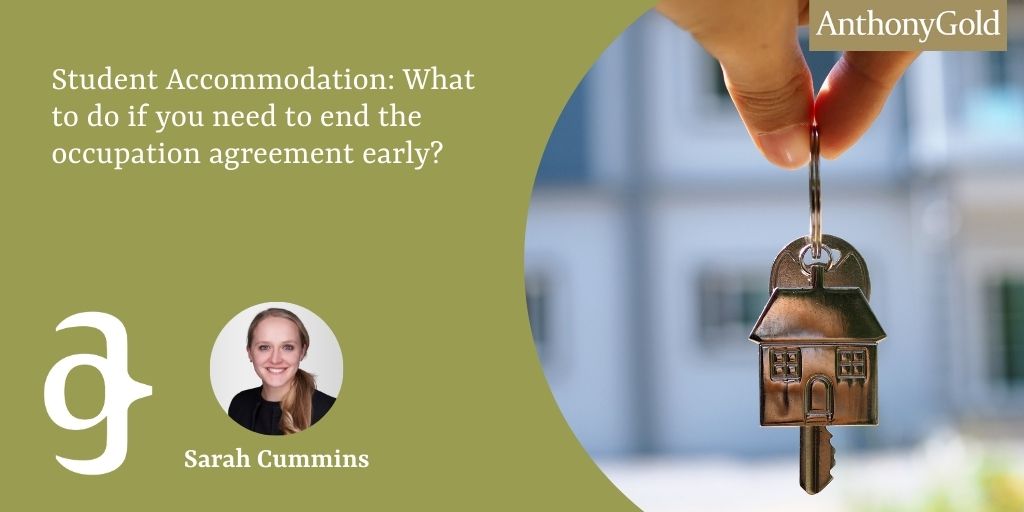Student Accommodation: What to do if you need to end the occupation agreement early?

In the last couple of weeks, thousands of students will have moved into university halls of residence in readiness for the new academic year. ‘How to end a student’s occupation agreement?’ may not be something that university landlords are thinking about at the start of term but it is important for accommodation managers to understand the legal basis for terminating agreements so that they can be prepared if issues occur during the course of the year.
What if a student drops out of their course, stops paying their accommodation fees and refuses to move out? What if a student is engaging in anti-social behaviour in halls? While many disputes can be resolved through discussion, the university landlord may have no choice but to take steps to end the student’s occupation early and recover possession of the accommodation.
An understanding of the legal framework, together with a well-drafted contract can help when difficult situations arise.
How can the occupation agreement be ended early?
To work out how the occupation agreement can be ended, the first question will be determining the legal basis on which the student occupies the accommodation. Is the student occupying under a licence agreement or a tenancy and, if a tenancy, what type? This will govern the rights the student has and the procedure that needs to be followed to bring the agreement to an end.
If the student has a licence agreement then they will have fewer rights. Licence agreements granted for a fixed period, for example, 10 months, will terminate when the fixed term comes to an end. At that point, the landlord is entitled to recover possession although they must do so by applying to the Court for a possession order as a student still residing in the accommodation will have protection from eviction under the Protection from Eviction Act 1977.
Does the occupation agreement contain a break clause?
If the agreement contains a break clause, then the landlord or student may be able to bring the agreement to an end early, without giving a reason, by serving notice in accordance with the clause.
Universities need to ensure that the terms of their agreements are fair. A break clause that only allows the landlord to bring the agreement to an end early is likely to be an unfair term.
If there is no break clause, then the landlord can usually only bring the licence to an end early if the agreement expressly allows it. This is why it is very important that the agreement includes early termination clauses that clearly set out the basis on which the university can end the agreement early if the student is in breach of the agreement.
Care must be taken when drafting these clauses to ensure that they are proportionate and not too broad, otherwise, they risk being found unfair and unenforceable.
If there is no fixed term and the licence agreement continues from week-to-week or month- to-month then this will be a periodic licence agreement.
Periodic licence agreements can be ended at any time by the landlord or student by serving a valid notice to quit. Notices to quit must comply with s5 of the Protection from Eviction Act 1977. Landlord notices to quit must contain prescribed wording although there is no prescribed form.
What if the student is a tenant?
If the student is a tenant then different rules will apply. Provided the letting falls outside the Housing Act 1988 (tenancies granted to students by universities that fall within paragraph 8, Schedule 1 of the Act are exempt) the student will have what is known as a ‘common law tenancy’ or ‘contractual tenancy.’
A fixed-term contractual tenancy will also expire at the end of the agreed fixed-term and can only be brought to an end early, without a reason, if the agreement contains a break clause.
The process for ending the agreement early for breach is different to a licence as the rules of forfeiture must be followed. The agreement must contain a forfeiture clause allowing the landlord to terminate the agreement early if the tenant is in breach.
If the breach relates to unpaid rent there may be no formal notice requirement although it is good practice to engage with the tenant before starting a court claim.
For non-rent related breaches a ‘s146 notice’ is required (pursuant to s146 of the Law of Property Act 1925). A s146 notice must set out the breach, state whether it is capable of remedy and, if appropriate, require compensation for the breach.
The notice must give a ‘reasonable period of time’ before the landlord can proceed to forfeit the tenancy. Forfeiture must take place through the Court which means the landlord must apply to Court for an order to recover possession of the property. Tenants can apply for relief from forfeiture. This is a complex area and university landlords should consider taking legal advice to ensure their notice is valid.
What if the student has an assured shorthold tenancy?
If the occupier has an assured shorthold tenancy, different procedures apply. The landlord will need to serve either a section 21 notice or a section 8 notice to terminate a tenancy. However, those notices will not apply to universities and other publicly funded educational institutions who let properties to their students, because such tenancies are excluded from ‘AST’ status.
The law surrounding ending licences and tenancies is complex. The terms of the contract need to be considered along with the housing legislation that applies to the student’s occupation status. Before starting a court claim it is almost always worth communicating with the occupier to see if the dispute can be resolved out of court. It may be possible to resolve issues by negotiation and parties can always decide to end a tenancy or licence early by mutual agreement.
At Anthony Gold, we have a team of specialists who can help if you need assistance recovering possession of accommodation, preparing contracts, seeking advice on your procedures or if you are looking for training for your accommodation managers.
* Disclaimer: The information on the Anthony Gold website is for general information only and reflects the position at the date of publication. It does not constitute legal advice and should not be treated as such. It is provided without any representations or warranties, express or implied.*
No comments